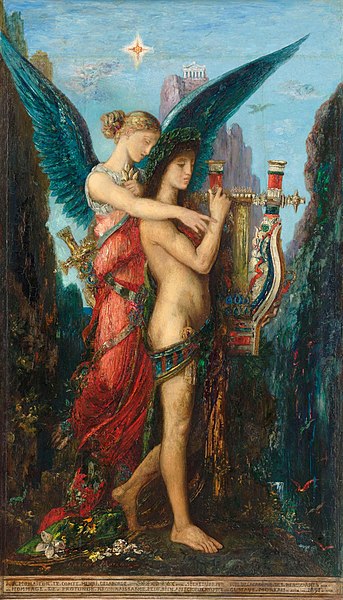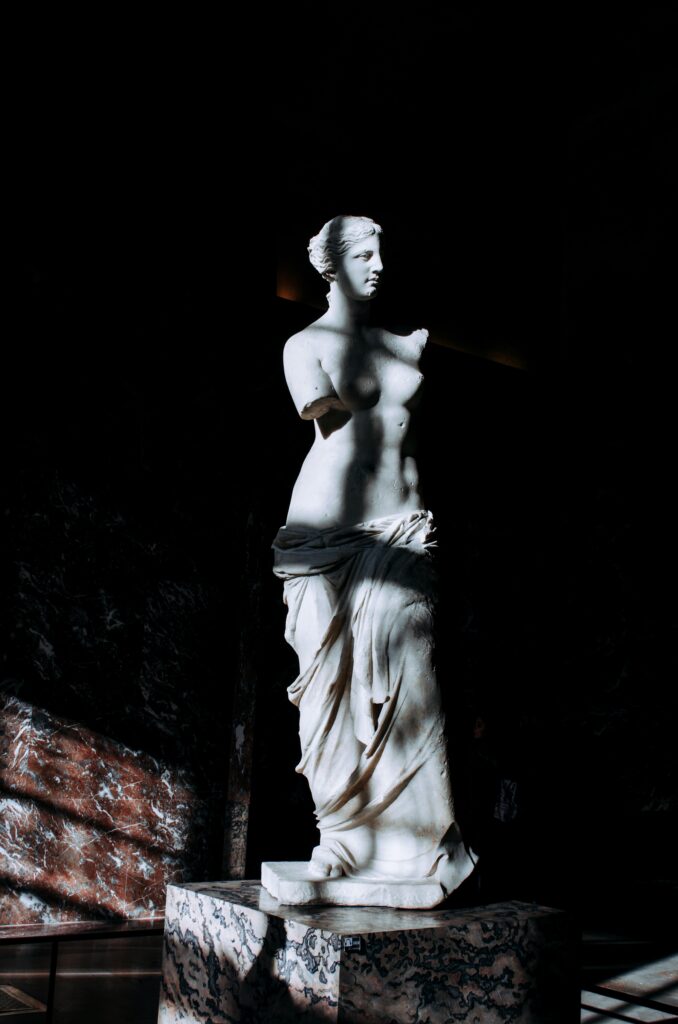Hesiod is a man who stands at the dawn of literature in Archaic Greece, a contemporary to Homer. Like Homer, Hesiod was also a poet–although he was not a rhapsode.
According to a story from Hesiod’s life, the Muses presented him with a laurel staff which is the sign of a poet, but they did not present him with a lyre which is the sign of a rhapsode. Being a rhapsode meant you were a professional performer of your work, so you would perform what you had composed like how Homer did with the Iliad and the Odyssey.

Since Hesiod was not a rhapsode, he likely did not perform his works. Although rhapsodes after him would do so!
Hesiod also is more than likely the one that transcribed the poetry that he composed himself. We have three works from him that have survived to see the modern day: Theogony, Works and Days, and Shield of Heracles. There are fragments of other works attributed to Hesiod and from his surviving works and those fragmented remains we can see that he used dactylic hexameter and Homeric Greek just like Homer.
When Did Hesiod Live?
Well, being a contemporary to Homer, we can most likely safely place Hesiod around the same time period that we place him: the 700s BC. However, there are actual indications for Hesiod himself that show us further evidence.
The Orphic traditions tended to try to place Hesiod before Homer, but this was likely thought to be because they preferred Hesiod to Homer since Hesiod seemed to enjoy the Orphic Hymns. The Classical Greeks and those that have come since have better determined that Homer’s Iliad is older than anything that Hesiod wrote that we have evidence of.
Something that Hesiod does that is unique to him at the time is place himself as an acting figure within this world that he writes about. Mentions of travels, other people, and wars have allowed scholars to conclude that Hesiod was most active between the years of 730 BC and 705 BC.
We also know that Hesiod clearly came before the era of lyricists and elegiac poetry which dominated Ancient Greek literature after 650 BC until it would be replaced by the rise of Greek Theatre. And we know that Hesiod could not have been writing before 750 BC because in his oldest works he mentions things in his current day that would not have been prominent before that point.
So we know Hesiod was after 750 BC and before 650 BC, and we know that Hesiod was most likely writing a lot of his work from 730 BC to 705 BC. This does a really good job of narrowing Hesiod down really fast.
Where Did Hesiod Live?
Hesiod gives us a very straightforward answer to this question himself. His place of dwelling was at the foot of Mount Helicon in the region of Ancient Greece known as Boeotia.
Hesiod tells us that his father came to that region from the city of Cyme, part of Aeolis, which makes Hesiod an Aeolian Greek. Hesiod describes the place as rather unpleasant, none of the seasons are particularly kind to the area–this is most likely what inspired Hesiod to write as much about farming as he did.
How Did Hesiod Die?
Accounts of Hesiod’s death vary. One of the popular versions involves Nemea.
Hesiod was warned by an oracle that if he went to Nemea he would die, so he fled as far from Nemea as possible. But was then killed at the temple to Nemean Zeus in Locris, causing a bit of irony to his death to be sure.
In another popular version of Hesiod’s death, he is killed in a Thespian raid. The Thespians had decided to raid the village he lived in, and he died in this raid. To protect themselves, the villagers followed the advice of the oracle and spread his ashes around their agora.
In one last ancient account of Hesiod’s death, he is falsely accused of assaulting a woman and then killed by her brother before the evidence proving his innocence could be revealed. It seems that all of these accounts of Hesiod’s demise are very dramatized, but the former two are from rather old traditions so one of them may be the closest to the truth.
Is Hesiod A Fraud?
Hesiod was actually accused of being a fraud by some of the ancients. Critics of his such as Pausanias rejected his works and claimed that he either did not write them or that he stole his material from someone else.
The most often victim of Hesiod’s supposed thievery are the Orphics. The claim is that Hesiod’s Theogony plagiarized some of the Orphic Hymns, especially the Orphic Hymn to Zeus.
However, based on comparing Hesiod’s works to each other and to other works, we do not believe this to be true today. While scholars place a greater priority on Homer, Hesiod is understood to have more than likely been the one to make his own works and no great fraudulence of content took place.
The Theogony
Usually considered to be Hesiod’s earliest work, the Theogony tells us the cosmology of the world, the creation of the gods, and a genealogy of them. The earliest known versions of myths about Pandora, Prometheus, and Cronus’s Golden Age all find their home in the Theogony’s words.
Hesiod is believed to have been making the Theogony to unite all Hellenes. Or at least this is what Herodotus tells us it is meant to accomplish.
The general idea is that all of the stories he tells and the origins he shares within the Theogony are gathered from the various Greek peoples of all the cities, islands, and regions he could hear from. This is also why the Theogony can be a bit difficult to understand, because it does hold elements that may be rejected by other Greeks–for example Homer and Hesiod disagreed on the origin of Aphrodite.

The Theogony, since it holds the Ancient Greek origin of the world and of their gods, has been compared to other mythological origin stories such as the Song of Kumarbi from the Hittites and the Enuma Elis from the Babylonians. There are some similarities between these origin stories but there are also plenty of things unique to each.
In addition to covering the origin of the world and gods, the Theogony also deals with the Titanomachy. The Titanomachy was the battle between Zeus and his father Cronus (as well as all of their respective allies) to see who would be the ruler of the cosmos.
As well as the Titanomachy, Hesiod also tells us of the battle between Zeus and Typhon. Though he refers to Typhon as Typhoeus instead.
Hesiod tells us of all the many children of Zeus, and even provides some order to tell us about when Zeus took which goddess or mortal as a lover and when each child was born. In fact, Hesiod even tells us that Zeus’s first wife was Metis, who would be the mother of Athena.
Works and Days
Hesiod’s next surviving work is Works and Days. In Works and Days, Hesiod talks much more about man. We believe this work was brought on by an agricultural related crisis that Greece was dealing with at the time he was writing.
Works and Days holds two truths. Labor is a lot given to all men universally and those who work will be able to survive. This makes Hesiod seem a bit like a pre-economist, and some do credit him as such.
Hesiod elaborates on his points of labor in a religious manner. He claims that the only source of good things in this world is labor and that the gods will hate and punish the idle men who try to do no work.
Hesiod also advocates for vegetarianism, or more specifically a high fruit diet, in this work. He claims this was the diet of the nonviolent people that made up the Golden Age under Cronus, and that it should be something we all strive for.
Shield of Heracles
The Shield of Heracles is the only other surviving work that we have from Hesiod that is not a fragment. This work seems to draw a fair amount of inspiration from the Iliad and would also later inspire future writers after Hesiod such as Virgil in some of Virgil’s own poetry.
We can tell Hesiod took inspiration from the Iliad in that he describes Heracles’s shield at one point in exactly the same way that a passage from the Iliad had described Achilles’s shield, without a single word altered. This may further reinforce the general consensus that Homer and Hesiod were contemporaries and also that Homer’s Iliad was written down before Hesiod’s own works–it even implies he was able to either read it or see it performed to know this detail down to a word for word match.
The plot of the Shield of Heracles essentially revolves around Heracles battling Cycnus who is the son of Ares. The actual theme of the tale is about Boeotia triumphing over Thessaly, as Heracles is a Boeotian hero triumphing over a hero of Thessaly–and the reason why Hesiod would be so eager to tell this story may have to do with a war between the two regions from his own time.
Hesiod’s Love For Hekate
Of all the deities that Hesiod writes about and gives praises to, there is none that he seems to hold in such a high personal regard as he does for Hekate. Hesiod does give to us her genealogy, telling us all about her Titan lineage that traces back to Koios and Phoebe, who are two of the original twelve Titans.
Hesiod gives us an entire hymn dedicated to Hekate within the Theogony where he writes about how she is honored in all of the realms as decreed by Zeus himself. This indicates to us that Hekate is one of the Titans that sided with Zeus against his father, Cronus, something that was rare (as most Titans either sided with Cronus or stayed neutral) but not unheard of in other cases (such as Titans like Prometheus or Helios that continue to be around and active after the Titanomachy).
Hesiod also paints an image of Hekate to us as someone that is a friend to all mankind. He tells us that Hekate is there to guide every king and to celebrate with every athlete in games and contests.
Hesiod tells us of Hekate’s work with Hermes and her work with livestock–something Hermes is also related to, being a god of herding.
A good reason for why Hesiod should feel so drawn to Hekate and want to praise her as much as he does is because Hekate’s cult held a very prominent position in his native Boeotia. A bit of a fun fact, it also held prominence in Thessaly as well.

What Makes Hesiod Important?
So what makes Hesiod so important that he is often compared to Homer and has produced several works managing to last the test of time? Largely, his establishment of the origin.
By choosing to tell us a full and detailed cosmology of how the world came to be, Hesiod provides us something very valuable to understanding the religion of the ancient Greeks and to learn more personal detail about the gods. Though some other poems have also tried to tell this story in ways, none of them have survived antiquity or held as much prominence in the traditions as Hesiod’s Theogony did.
So perhaps it is like Plutarch said, Hesiod is important for his attempt to unite the Hellenes on a religious and culture level in a time when Greece was right in the middle of a history of constant division and neighborly wars.
Pingback: Who Is Ares? - Esoteric History